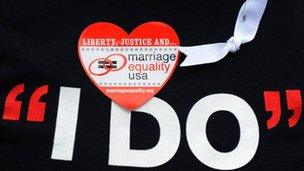In the media: Obama endorses gay marriage
- Published

In the wake of President Barack Obama's comments that he feels same-sex couples should be able to marry, during an interview with ABC News' Robin Roberts, US media analyse the political impact of the president's position.
Writing for the New Yorker, <link> <caption>Richard Socarides says</caption> <url href="http://www.newyorker.com/online/blogs/newsdesk/2012/05/gay-marriage-why-obama-couldnt-wait.html#ixzz1uPKtTOZV" platform="highweb"/> </link> that President Obama's endorsement of same-sex marriage was based on political considerations.
"Clearly, until today, the president had been making a political calculation - one that had outlived its usefulness. In some ways, it's amazing that he was able to maintain a not-yes-but-not-no position for as long as he did. While it was a useful electoral strategy, changes in public opinion and in the culture have created a new reality."
Meanwhile, the New York Times' <link> <caption>Frank Bruni writes</caption> <url href="http://bruni.blogs.nytimes.com/2012/05/09/no-matter-their-impact-historic-words/?hp" platform="highweb"/> </link> that the president's comments have great historic and emotional significance.
"Over recent days it has been observed that the president's position on this didn't and wouldn't make immediate or enormous difference in the actual law of the land. That remains true. States decide on marriage - as North Carolina did, regressively, on Tuesday - and no signal or word from the president is going to translate into the legalisation of same-sex marriage from coast to coast. But that doesn't diminish the emotional importance of what just happened."
Others, such as <link> <caption>Jonathan Bernstein for the Washington Post</caption> <url href="http://www.washingtonpost.com/blogs/post-partisan/post/a-historic-moment-but-one-with-little-electoral-effect/2012/05/09/gIQAt70bDU_blog.html" platform="highweb"/> </link> have played down the importance of President Obama's comments.
"At the margins, Obama's new position makes him slightly more prepared for the fall campaign; should marriage hit the headlines (say, from a major court decision), it's probably easier for him to talk about it now than it was under his old position. And I'm not saying that social issues overall are not important politically. They certainly can be - but their importance, so to speak, has already happened; those who care about these things have sorted themselves by party long ago. So mostly, as far as November is concerned, this new wrinkle just doesn't seem likely to have any effect at all."
But <link> <caption>Carol Lee for the Wall Street Journal</caption> <url href="http://online.wsj.com/article/SB10001424052702304070304577394332545729926.html?mod=WSJ_hp_LEFTTopStories" platform="highweb"/> </link> suggests that by clarifying his position on gay marriage, the president has offered a further contrast between himself and his Republican opponent.
"Mr Obama's position puts him squarely at odds with that of Mitt Romney, the presumptive Republican nominee. Mr Romney has said he believes marriage should be between a man and a woman, a stance he repeated this week. Mr Romney also opposes civil unions and has said he would back a constitutional amendment defining marriage as between a man and a woman."
And <link> <caption>CNN's Dan Gilgoff says</caption> <url href="http://religion.blogs.cnn.com/2012/05/09/obamas-gay-marriage-support-riles-religious-conservatives-but-political-effects-not-yet-clear/" platform="highweb"/> </link> that the political consequences of President Obama's comments are far from clear yet.
"Obama stressed in the interview that his support was personal and that he would leave the issue of marriage to the states. But many conservatives chafed at the idea that the president's personal views would not affect public policy."